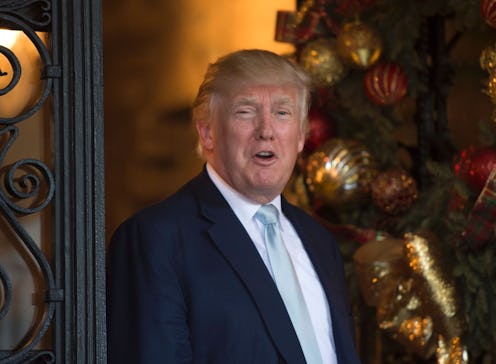News
POTUS News Corp: A Brave New World Of Politics

A few months before the election, when Donald Trump appeared headed for sure defeat, a story broke about a possible Donald Trump media venture dubbed "Trump TV." Trump would have recognized he had a unique ability to grab and hold media attention, not to mention the rapt gaze of his core base. But he was not reaping any of the financial rewards, and this could be a problem. Thus his war with the media — his endless swipes at journalists by name and publication, his promise to curb press freedoms, his exhortations to rally goers to harass quite literally caged reporters (kept in a "designated pen") — suddenly seemed part of a larger strategy. Delegitimize the press entirely (they're liars, they're stupid, they're biased), and he would create his own market opening, set up shop, and watch the money roll in, with or without a presidential title.
But, then, he won. That no one seemed to know how to immediately respond to Trump's win is understandable. The most that many disappointed voters could muster was perhaps best summed up in the that week's episode of Saturday Night Live, where Dave Chappelle offered in his opening monologue: "I'm going to give Trump a chance."
Skeptical Americans watched and waited, hoping a "presidential" Trump would emerge to liquidate his businesses, make good on his promise to "drain the swamp," or at the very least, stop tweeting.
Trump has delivered on none of those points, but it the last one, his refusal to delete his Twitter account, that is the most indicative that we've entered a new and frightful era of government by way of media domination.
Emily Bell, the director of the Tow Center for Digital Journalism at Columbia, recently sent out a series of tweets recognizing this new reality of the presidency as news medium.
Bell also points out that Trump is "ratings-driving in all respects, (as someone who is actually a TV star would be)." To such a person, the hiring of Steve Bannon as chief strategist makes a world of sense. Here is a man who as CEO of Breitbart News took the small conservative website to national prominence by a deluge of provocative pro-Trump headlines. Bannon embraced controversy in the name of clicks, much the same way Trump won over $2 billion of free advertising, often by starting or suggesting an array of scandals. As Bell also acknowledges, in such an approach Trump doesn't need "actual political strategy"; he needs a masterful editor to help drive the news cycle to his fancy.
How obsessed with ratings, fame, and hogging all the media clicks is Trump? Just yesterday, the man who is about to become president of the United States of America felt it a reasonable use of his time to troll Arnold Schwarzenegger in his new role as the boss on Celebrity Apprentice.
This is the new reality: The presidency is to become Donald Trump's megaphone for personal brand promotion. Bell seems to argue that we should accept what is, and get on with figuring out how to cover Trump. (She suggests sending television reviewers to the White House.)
Yet, to simply allow Trump to redefine the presidency would be a grave mistake. The job of any president does include selling their ideas to the public, which naturally entails a good deal of marketing and media savvy. President Obama himself has become quite masterful at harnessing the power of social media and pop culture to endear himself to voters. Good for him.
But a president has many other, much more consequential hats to wear. He has to understand how the economy works, and he needs to know the legal realities and practical machinations of how our government actually functions.
Perhaps most important is his international role, for no other single person has more immediate and consequential impact on world stability (or lack thereof) than the president. And in that, Trump is almost perfectly poised for disaster. He has refused his daily intel briefs, he claims to know more about ISIS than military generals, and he has buddied up with Vladimir Putin. The same Putin who has invaded neighboring countries, played a key role in Syria's genocide, not to mention baffled and outmaneuvered three previous administrations from divergent sides of the political spectrum.
Trump may keep his Twitter and he may have his Bannon, but that does not mean we must simply accept good spin in lieu of good governance. No amount of disinformation, or distraction, no matter how effective, can alter reality. (For instance, even if every media outlet refused or was barred from reporting on Syria, that wouldn't change the tragedy there, with tens of thousands of children dead.)
Trump's strategy of trashing traditional journalists so he can better own the media "narrative" doesn't give him some new corner on facts or truth. And it is imperative to insist that Trump be judged on the basis of his performance as president, not as spin doctor or master communicator.